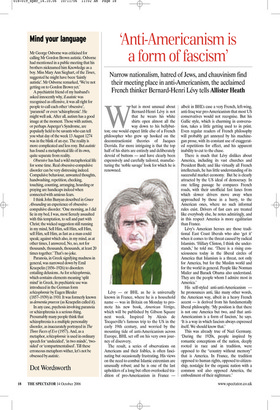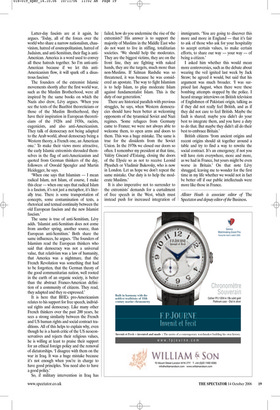‘Anti-Americanism is a form of fascism’
Narrow nationalism, hatred of Jews, and chauvinism find their meeting place in anti-Americanism, the acclaimed French thinker Bernard-Henri Lévy tells Allister Heath What is most unusual about Bernard-Henri Lévy is not that he wears his white shirts open almost all the way down to his bellybutton; one would expect little else of a French philosopher who grew up hooked on the deconstructionist theories of Jacques Derrida. Far more intriguing is that the top half of his shirts are entirely and deliberately devoid of buttons — and have clearly been expensively and carefully tailored, manufacturing the ‘noble savage’ look for which he is renowned.
Lévy — or BHL as he is universally known in France, where he is a household name — was in Britain on Monday to promote his new book, American Vertigo, which will be published by Gibson Square next week. Inspired by Alexis de Tocqueville’s famous trip to the US in the early 19th century, and worried by the mounting tide of anti-Americanism across Europe, BHL set off on his very own journey of discovery.
The result, a series of observations on Americans and their foibles, is often fascinating but occasionally frustrating. His views on the need to combat Islamic extremism are unusually robust; and he is one of the last upholders of a long but often overlooked tradition of pro-Americanism in France — albeit in BHL’s case a very French, left-wing, anti-Iraq war pro-Americanism that most US conservatives would not recognise. But his Gallic style, which is charming in conversation, takes a little getting used to in print. Even regular readers of French philosophy will probably get annoyed by his machinegun prose, with its constant use of exaggerated repetitions for effect, and his apparent inability to cut to the chase.
There is much that Lévy dislikes about America, including its vast churches and President Bush; and like virtually all French intellectuals, he has little understanding of its successful market economy. But he is clearly attracted by the US ideal of democracy. In one telling passage he compares French roads, with their unofficial fast lanes from which slower drivers move away when approached by those in a hurry, to the American ones, where no such informal rules exist. Drivers of fast cars are treated like everybody else, he notes admiringly, and in this respect America is more egalitarian than France.
Lévy’s American heroes are those traditional East Coast liberals who also ‘get it’ when it comes to the threat caused by radical Islamists. ‘Hillary Clinton, I think she understands,’ he told me. ‘There is a rising consciousness today in the liberal circles of America that Islamism is a threat, not only for America, but for the Muslim world and for the world in general. People like Norman Mailer and Barack Obama also understand. They are the people whom I admire most in America.’ His self-styled anti-anti-Americanism he pronounces anti, like many other words, the American way, albeit in a heavy French accent — is derived from his fundamentally liberal philosophy. ‘My position is that there is not one America but two, and that antiAmericanism is a form of fascism,’ he says. ‘It is a way in which fascism always expressed itself. We should know that.’ This was already true of Nazi Germany. ‘During the 1920s, people inspired by romantic conceptions of the nation, deeply rooted in race and in tradition, were opposed to the “country without memory” that is America. In France, the tradition opposed to human rights, opposed to citizenship, nostalgic for the organic nation with a common soil also opposed America, the embodiment of their nightmare.’ Latter-day fascists are at it again, he argues. ‘Today, all of the forces over the world who share a narrow nationalism, chauvinism, hatred of cosmopolitanism, hatred of Judaism, and anti-Semitism, their flag is antiAmerican. America is a word used to convey all these hatreds together. So I’m anti-antiAmerican because if we let this antiAmericanism flow, it will spark off a disastrous fascism.’ The founders of the extremist Islamic movements shortly after the first world war, such as the Muslim Brotherhood, were all inspired by the same books on which the Nazis also drew, Lévy argues. ‘When you see the texts of the Baathist theoreticians or those of the Muslim Brotherhood, they have their inspiration in European theoreticians of the 1920s and 1930s, racists, eugenicists, and also anti-Americanism. They talk of democracy not being adapted to the Arab world, about democracy being a Western theory, a French one, an American one.’ To make their views more attractive, the early Islamic extremists shrouded themselves in the flag of anti-Americanism and quoted from German thinkers of the day, followers of Oswald Spengler and Martin Heidegger, he says.
‘When one says that Islamism — I mean radical Islam, not Islam, of course, I make this clear — when one says that radical Islam is a fascism, it’s not just a metaphor, it’s literally true. There is some transportation of concepts, some contamination of texts, a rhetorical and textual continuity between the old European fascism and the new Islamist fascism.’ The same is true of anti-Semitism, Lévy adds. ‘Islamist anti-Semitism does not come from another spring, another source, than European anti-Semitism.’ Both share the same influences, he argues. ‘The founders of Islamism read the European thinkers who said that democracy was not a universal value, that relativism was a law of humanity, that America was a nightmare, that the French Revolution was something that had to be forgotten, that the German theory of the good communitarian nation, well rooted in the earth of an organic society, is better than the abstract Franco-American definition of a community of citizens. They read, they adapted and they re-expressed.’ It is here that BHL’s pro-Americanism relates to his support for free speech, individual rights and democracy. Like many other French thinkers over the past 200 years, he sees a strong similarity between the French and US human rights and social contract traditions. All of this helps to explain why, even though he is a harsh critic of the US neoconservatives and rejects their religious values, he is willing at least to praise their support for an ethical foreign policy and the removal of dictatorships. ‘I disagree with them on the war in Iraq. It was a huge mistake because it’s not enough when you’re in charge to have good principles. You need also to have a good policy.’ So, if military intervention in Iraq has failed, how do you undermine the rise of the extremists? His answer is to support the majority of Muslims in the Middle East who do not want to live in stifling, totalitarian societies. ‘We should help the moderates. They are the biggest victims, they are on the front line, they are fighting with naked hands, they are the targets, much more than non-Muslims. If Salman Rushdie was so threatened, it was because he was considered an apostate. The way to fight Islamism is to help Islam, to play moderate Islam against fundamentalist Islam. This is the duty of our generation.’ There are historical parallels with previous struggles, he says, when Western democracies should have been better at welcoming opponents of the tyrannical Soviet and Nazi regimes. ‘Some refugees from Germany came to France; we were not always able to welcome them, to open arms and doors to them. This was a huge mistake. The same is true for the dissidents from the Soviet Union. In the 1970s we closed our doors so often. I remember my president at that time, Valéry Giscard d’Estaing, closing the doors of the Elysée so as not to receive Leonid Plyushch or Vladimir Bukovsky, who is now in London. Let us hope we don’t repeat the same mistake. Our duty is to help the moderate Muslims.’ It is also imperative not to surrender to the extremists’ demands for a curtailment of free speech in the West, which must instead push for increased integration of immigrants. ‘You are going to discover this more and more in England — that it’s fair to ask of those who ask for your hospitality to accept certain values, to make certain efforts, to share our way — your way — of being a citizen.’ I asked him whether this would mean more controversies, such as the debate about wearing the veil ignited last week by Jack Straw; he agreed it would, but said that his argument was much broader. ‘I was surprised last August, when there were these bombing attempts stopped by the police. I heard strange interviews on British television of Englishmen of Pakistani origin, talking as if they did not really feel British, and as if they did not care to feel British. Maybe the fault is shared; maybe you didn’t do your best to integrate them, and you have a duty to do that. But maybe they didn’t all do their best to embrace Britain.’ British citizens ‘from ancient origins and recent origins should sit together around a table and try to find a way to rewrite the social contract. It’s an emergency; if not you will have riots everywhere, more and more, as we had in France, but yours might be even worse in Britain.’ On that note Lévy shrugged, leaving me to wonder for the first time in my life whether we would not in fact be better off if our public intellectuals were more like those in France.



































































































 Previous page
Previous page